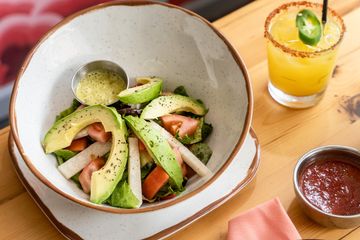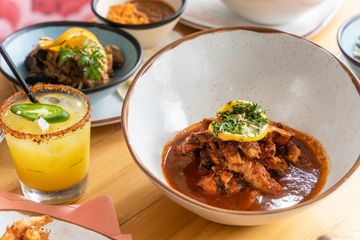Is Mexican Food Healthy And Balanced? Unloading the Nutritional Advantages of Traditional Ingredients
The inquiry of whether Mexican food is healthy and balanced invites an exploration of its traditional active ingredients. Beans and corn offer as foundational staples, rich in protein and fiber. Avocados offer valuable fats, while various herbs and flavors include flavor and health advantages - churros. With each other, these components produce a tapestry of nourishment. The healthfulness of Mexican food frequently depends on preparation approaches and part sizes. What duty do these variables play in determining its overall dietary value?
The Power of Beans: Protein and Fiber-Rich Staples
Typically forgotten, beans offer as a keystone of Mexican food, using a wide range of nutritional benefits. Rich in healthy protein, they are an excellent plant-based choice for those looking for to fulfill their nutritional healthy protein requires. This high protein content supports muscle mass repair work and growth, making beans invaluable for both meat-eaters and vegetarians alike. Furthermore, beans are an exceptional resource of nutritional fiber, which assists in food digestion and advertises a feeling of volume, possibly assisting with weight administration.
The selection of beans made use of in Mexican meals, such as black beans, pinto beans, and kidney beans, adds to a diverse flavor account and can boost meals nutritionally. Beans are low in fat and contain necessary vitamins and minerals, consisting of iron, folate, and magnesium. Together, these qualities make beans a critical active ingredient, providing both sustenance and nourishment in standard Mexican fare.
Corn: a Versatile Grain With Nutritional Conveniences
Corn sticks out as a flexible grain essential to Mexican cuisine, commemorated not only for its cooking applications however likewise for its excellent nutritional profile. As a key active ingredient in dishes like tortillas, tamales, and pozole, corn provides important nutrients that add to a well balanced diet. Rich in carbs, it acts as a substantial energy resource, while additionally being reduced in fat, making it a favorable option for different nutritional demands.
Furthermore, corn is a great source of nutritional fiber, which helps in food digestion and promotes satiation. It contains considerable amounts of vitamins such as B-complex vitamins, which are essential for basal metabolism. The existence of anti-oxidants, particularly carotenoids, adds to overall wellness by minimizing oxidative tension. Additionally, corn is gluten-free, accommodating those with gluten level of sensitivities. Generally, the dietary benefits of corn underscore its relevance in standard Mexican food and its role in a healthy and balanced diet plan.
Avocados: Healthy Fats and Nutrients in Every Bite
Avocados play a significant duty in Mexican food, matching dishes with their velvety structure and abundant taste. Beyond their culinary appeal, avocados are celebrated for their outstanding nutritional profile. They are a rich resource of healthy monounsaturated fats, which can aid reduced bad cholesterol degrees and assistance heart wellness. Furthermore, avocados are loaded with essential minerals and vitamins, including potassium, vitamin E, and B vitamins, adding to total wellness.
The high fiber material in avocados help digestion and promotes satiety, making them a helpful enhancement to any kind of dish. Their distinct nutrient composition can also support skin health and wellness and supply anti-inflammatory advantages. Including avocados click for info right into traditional Mexican dishes or appreciating them as a standalone snack can improve both flavor and nourishment, showing why they are a beloved staple in Mexican food. On the whole, avocados use a tasty means to delight in healthy fats and crucial nutrients in every bite.

Herbs and flavors: Flavorful Health And Wellness Boosters
While delighting in the abundant tastes of Mexican food, one can not ignore the necessary function that spices and herbs play in improving both taste and wellness. Ingredients such as oregano, cilantro, and chili peppers not just contribute to the lively flavor profile but likewise supply substantial health advantages. Cilantro is known for its detoxing properties, assisting to eliminate hefty steels from the body, while oregano is packed with anti-oxidants and has anti-inflammatory impacts.
Chili peppers, a staple in several Mexican recipes, contain capsaicin, which has actually been linked to improved metabolic process and discomfort alleviation. Furthermore, spices like cumin and coriander assistance food digestion and might assist in blood glucose regulation. Including these savory health and wellness boosters into dishes not just boosts the cooking experience but likewise promotes total wellness, making Mexican food not just tasty, however additionally nutritionally useful.
Standard Food Preparation Methods: Enhancing Nutrition and Taste
Traditional click for source cooking approaches in Mexican food play an essential function in improving both nourishment and flavor, as they usually focus on time-honored methods and fresh components. Methods such as nixtamalization, where corn is soaked and cooked in an alkaline option, not just boost the nutrient account of tortillas however likewise enhance their digestibility - tacos. Additionally, using slow cooking techniques, like cooking or braising, enables flavors to blend magnificently while retaining the integrity of the components

Frequently Asked Questions
Are Mexican Food Portions Normally Larger Than Other Cuisines?
Mexican food sections are usually bigger than those of numerous various other foods. This particular reflects traditional eating techniques, highlighting communal sharing and hearty meals, which can lead to a much more considerable serving size in general.
Exactly how Does the Preparation Method Affect Healthfulness of Mexican Food?
Preparation techniques substantially influence the healthfulness of Mexican food. Strategies such as grilling or steaming preserve nutrients, while frying can raise unhealthy fat web content. Options of ingredients and cooking styles inevitably identify overall nutritional worth.
Can Mexican Food Be Tailored for Certain Nutritional Constraints?
Mexican food can certainly be customized for specific nutritional constraints. Substitutions, such as using corn tortillas for gluten-free diet plans or integrating even more veggies, allow people to take pleasure in conventional flavors while fitting various dietary needs.
What Are Typical Misconceptions About Mexican Food and Wellness?
Common mistaken beliefs regarding Mexican food consist of the idea that it is inherently undesirable, overly spicy, and entirely concentrated on fats. Actually, conventional dishes often include nourishing ingredients and can be customized to numerous nutritional demands.
Are There Much Healthier Choices at Mexican Restaurants?
Much healthier alternatives at Mexican restaurants frequently include barbequed meats, beans, and fresh veggies. Choosing meals that stress entire ingredients and preventing heavy sauces can bring about a more nourishing dining experience, advertising overall health.
The variety of beans used in Mexican recipes, such as black beans, pinto beans, and kidney beans, adds to a diverse taste profile and can improve meals nutritionally. Avocados play a significant function in Mexican food, matching meals with their luscious structure and abundant flavor. Including avocados right into standard Mexican recipes or appreciating them as a standalone snack can improve both flavor and nourishment, demonstrating why they are a cherished More Info staple in Mexican food. While taking pleasure in the abundant tastes of Mexican food, one can not overlook the necessary duty that spices and herbs play in improving both taste and wellness. Typical cooking techniques in Mexican cuisine play an important role in improving both nutrition and taste, as they often prioritize time-honored techniques and fresh active ingredients.